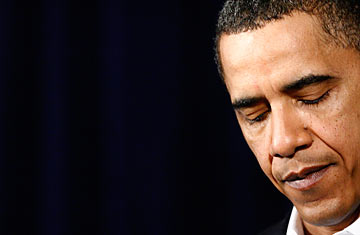
(6 of 6)
I think in Afghanistan, as difficult as those choices were — and me sending in additional troops over the next two years was probably the toughest decision that I've made this year among a lot of very tough decisions, because it involved the lives of young men and women in uniform. We are monitoring very carefully how it's being executed. And I think that General [Stanley] McChrystal, General [David] Petraeus, [U.S. ambassador to Afghanistan] Karl Eikenberry and others are working double time to successfully implement this. I know that you've written, Joe, that there may be some questions in terms of pace of getting troops in. I can assure you that a fire is lit under them about making that happen.
That's one of the reasons I wrote that.
They want it to happen. And we are more or less going to be on schedule. We are probably ahead of schedule so far in terms of recruiting and training Afghans. Although I've said that we should set very modest expectations of what's sustainable to transfer to an Afghan government.
On Iran, one of our trickiest foreign policy challenges, we have held the international community together, both in our engagement strategy, but also now as we move into a dual-track approach. Which is, If they don't accept the open hand, we've got to make sure they understand there are consequences for breaking international rules. It's going to be tough, but I think the relationship we've developed with Russia will be very helpful. The outreach we've done to our traditional NATO allies will be very helpful. The work that we've done with China — including the work we've done with China to enforce sanctions against North Korea — will help us in dealing more effectively with Iran.
I mentioned North Korea — everybody was skeptical at the beginning of this year that we could get serious sanctions. Not only have we gotten serious sanctions, but they've actually been implemented. And finally — because this has been the area of most immediate concern — when it comes to counterterrorism, this Administration has taken out more al-Qaeda high-level operatives, has been more aggressive in pinning them down, not just in the border regions of Afghanistan and Pakistan, but also working with our international partners in places like Yemen and Somalia, than a lot of what's taken place previously.
Having said that, there's no doubt, as I said, that I think our intelligence failures in picking up [Nigerian terrorism suspect Umar Farouk] Abdulmutallab shows how much more has to be done. I think everybody understands that this is an area where we have to be relentless regardless of what else is on our plate. The other area which I think is worth noting is that the Middle East peace process has not moved forward. And I think it's fair to say that for all our efforts at early engagement, it is not where I want it to be.
Why is that? My sense of it is that [U.S. special envoy to the Middle East George] Mitchell spent a number of months negotiating a settlement deal and saw some progress from the Israelis and kind of got blinded by that, because he didn't see that it wasn't sufficient progress for the Palestinians.
I'll be honest with you. A) This is just really hard. Even for a guy like George Mitchell, who helped bring about the peace in Northern Ireland. This is as intractable a problem as you get. B) Both sides — the Israelis and the Palestinians — have found that the political environment, the nature of their coalitions or the divisions within their societies, were such that it was very hard for them to start engaging in a meaningful conversation. And I think that we overestimated our ability to persuade them to do so when their politics ran contrary to that. From [Palestinian Authority President Mahmoud] Abbas' perspective, he's got Hamas looking over his shoulder and, I think, an environment generally within the Arab world that feels impatient with any process.
And on the Israeli front — although the Israelis, I think, after a lot of time showed a willingness to make some modifications in their policies, they still found it very hard to move with any bold gestures. And so what we're going to have to do — I think it is absolutely true that what we did this year didn't produce the kind of breakthrough that we wanted, and if we had anticipated some of these political problems on both sides earlier, we might not have raised expectations as high. Moving forward, though, we are going to continue to work with both parties to recognize what I think is ultimately their deep-seated interest in a two-state solution in which Israel is secure and the Palestinians have sovereignty and can start focusing on developing their economy and improving the lives of their children and grandchildren.
